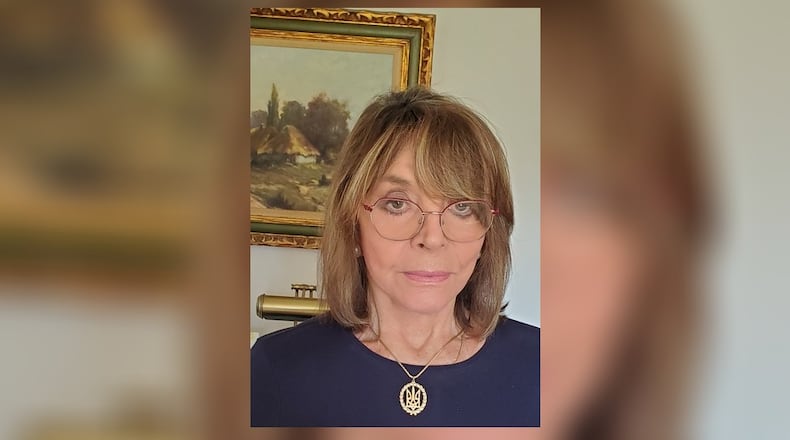Ukraine’s bravery, blue and yellow flags, and the millions of her refugees pouring into neighboring countries are now known the world over. Civilized nations are outraged as they watch the relentless and systematic destruction of a country and its people, and they have risen in unison to offer asylum to refugees and support, both military and humanitarian, to the imperiled country.
It seems the war has been raging forever, yet as I look back on those nine months, it’s as if it were yesterday that I received the first of many anguished, hastily written emails from my niece Julia in Kharkiv and my cousin Victoria in Kyiv. As sirens were wailing and bombs exploding, they chronicled those nightmarish first days; there was fear, bewilderment, and terror. Where to find a bomb shelter? How to escape? Where to go?
And those emails terrified me. Because of the seven-hour time difference, to make sure that I wouldn’t miss anything, I obsessively turned on the computer in the middle of the night waiting for a word. The frantic, panicked messages poured in with awful regularity, each one more shocking than the previous.
Those first days turned me into a zombie. In class, one of my students noticed that I wasn’t “all there.” When I explained, the next day she brought me a plant in a blue and yellow pot that she had painted herself — a touching gesture of solidarity, something I encountered everywhere after the Dayton Daily News published my initial three accounts earlier this year.
My cousin Victoria, her daughter Lena and Lena’s six-year-old twins were in the first wave of those who managed to get on a train for Warsaw. Andriy, Lena’s husband, stayed in Kyiv to fight; he’s still there.
Poland was extraordinarily welcoming, initially putting them up in a hotel, offering meals, clothing, and eventually shelter in a sprawling dormitory. But Poland was overwhelmed. Since it borders Western Ukraine, it was the first country to feel the pressures of the influx of refugees. As Victoria wrote: “We are safe, we are eternally grateful to Poland, but we must think of the future — children need stability, school, a sense of normalcy…”
With the help of various organizations and dozens of volunteers who came out en masse to help — a phenomenon the refugees encountered everywhere — they moved on to Cologne, Germany, where Lena had a friend with whom they were able to stay the first few days. After that, a new adventure and new concerns.
In April, Victoria left for Chicago to stay with a Russian family where she had worked on and off for several years, leaving Lena on her own with the children, a situation shared by millions of women whose husbands are back home fighting. I am in awe of this young woman, alone in a foreign country — no money, no language, anguished about her husband’s fate, trying to make a life for herself and her two little boys. Somehow, struggling, fighting tooth and nail, filling out endless documents which would allow her to stay and to receive a stipend, to find a place to live, to arrange for German lessons and so forth, Lena is a survivor.
Now, she has an apartment with a room for Victoria, who re-joined her family last month. The children are in school, adjusting to their new life, and Lena is learning German and even manages to continue online the work she did in Ukraine, running her advertising company. Not much to advertise these days, but Kyiv is clinging to normalcy. And of course, she maintains contact with Andriy when she can, when there’s electricity.
Lena can’t find words to express her gratitude to Germany and German people who helped her, from giving her rides, to installing a refrigerator, to bringing a keyboard for the boys to practice their piano. Lena says: “The irony of us, Ukrainians being helped by Germans who 80 years ago trampled through Kyiv as invaders! Now Russians are the aggressors. Who would have thought?”
Ukrainian refugees no longer fear for their lives, but now what? If they are permitted to stay in the country where they end up, they will be immigrants, aliens trying to adjust to a foreign language and an unknown way of life. I know what it’s like. My parents were refugees from Ukraine after WWII, and I grew up as an immigrant, tossed from country to country, and from language to language before being accepted by the United States.
Ukraine is in my heart. I am of Ukrainian descent, but an American in every way — citizenship, language, education, decades of immersion in the culture of the United States. When asked about my nationality, I always respond “Ukrainian,” but I love this country that welcomed my family with open arms and allowed me to be an American in every way.
Tatiana Liaugminas was born after WWII to Ukrainian parents, refugees from the former Soviet Union. She’s an American citizen, with relatives in Ukraine. She teaches Russian at the University of Dayton.
About the Author

